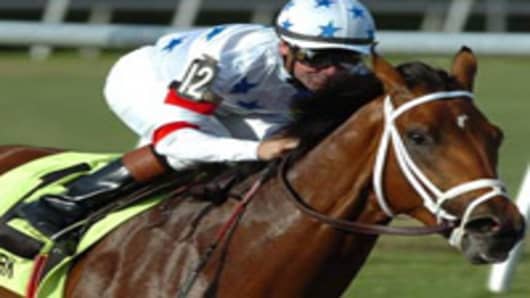One of the greatest sports business stories of the year was Big Brown and the horse’s quest to win the Triple Crown. It was the perfect story for me. Owners in the financial world, hoping to start a hedge fund, have a horse that’s one race away from history.
Books and movies being talked about and sharp bettors cashing in on the long shot; including one guy we found who won $60,300 off Big Brown winning the Kentucky Derby.
But things didn’t go as planned for the owners, IEAH Stables, as Big Brown finished the Belmont in last place. The horse came back to win the $1 million Haskell Invitational and won again in September to set up a race against Curlin in the Breeders’ Cup Classic. An injury required Big Brown to retire at stud. I recently talked to IEAH Stables co-owner Michael Iavarone about life after Big Brown.
Darren: During Big Brown’s run, the big story we talked about on CNBC was starting this horse hedge fund. What happened to that idea?
Iavarone: We made a mistake in not starting it a bit sooner. There was so much happening through the middle of July that we didn’t really have time to concentrate on it. Then we were heavy into paperwork, getting ready to unveil it in September and then everything hit the fan. We realized that it would challenging to try to make money in this environment. The lack of liquidity out there made it hard to take advantage in the upside of our assets. People are just so incredibly tight with their money. So why work twice as hard to sell it now?
Darren: How much did you lose from the horse not winning the Belmont?
Iavarone: I figure $50 million to $60 million and I think if we were able to race against Curlin and beat him, we could have gotten back to the price we were at before the Belmont. But that’s a conservative number when you consider the horse’s now discounted stud price, the merchandising, book deals and movie deals that we were lining up. And you have to remember, that loss number is closer to $100 million if we were in a good economy.
Darren: Let’s talk about stud prices. The deal for Big Brown to stand at stud at Three Chimneys Farm in Kentucky was announced on the day of the Preakness. The value was reported to be $50 million. Given the economy, how did things work out?
Iavarone: If Big Brown would have won the Belmont, he could have had a stud price of $300,000 times, figure, 150 mares. That’s $45 million a year. When the horse didn’t win, we were still counting on Big Brown to stand for $150,000. But then prices were slashed across the board by about 40 or 50 percent because of the economy. Distorted Humor went from a stud fee $225,000 to $150,000. Smarty Jones (who stood for his first three seasons at $100,000) went private because they didn’t want the price out there and wanted to be able to negotiate. And our stud fee went to $65,000, which will put us in line for something closer to a $10 million first year. It’s a tricky situation because we want to make sure we’re competitive because we want to see the best mares in the first year, which is obviously the most commercial. The second and third year are more wait-and-see and then year four is obviously important again.
Darren: Is the horse hedge fund idea going to come back?
Iavarone: Absolutely. It will definitely be done in the right situation. That means in an environment where you can raise money and there’s confidence not only in the horse marketplace, but in the marketplace in general. Then we have to clean up the investment world and hedge funds, given the scandals and lack of liquidity. And then to keep it going, the key is to show enough success that you won’t get annihilated by redemptions. Outsiders think it’s all about Big Brown and it’s not. We’re pretty confident that we’ll be owners of the year. We won 11 grade 1 races with eight different horses and five different trainers. In any other year, this fund would be amazing. Just look at our performance. We’ve improved every year. In 2005, we had purse earnings of $1 million off 111 races. In 2006, we won $2 million from 138 races. In 2007, we won $4 million in 197 races and this year we won $10.7 million in 238 races.
Darren: We’ve now gone 30 years without a Triple Crown winner. Do you think it will ever happen again?
Iavarone: I believe it will. It’s just that everything will have to go perfectly in order for a horse to pull it off. We were perfect for the first two races and then the world fell apart on Big Brown.
Darren: Do you think you guys will be back to the grand stage of Triple Crown racing?
Iavarone: Our goal is to get back to the Kentucky Derby. But think about the odds. Every year, there are 40,000 horses born and 20 of them are put in the starting gate at Churchill Downs. Then think about the fact 11 horses have won the Triple Crown with 40,000 horses born every year. We’d have to be really fortunate to have another shot.
Darren: How long did it take to get over what happened at the Belmont?
Iavarone: I still haven’t gotten over it. But I’ve made peace with it. It doesn’t have anything to do with money. We were climbing Mount Everest. This was history. It was disappointing, but I wouldn’t trade in that experience. I’d give anything to do it all over again.
Previous posts on Big Brown:
Questions? Comments? SportsBiz@cnbc.com



